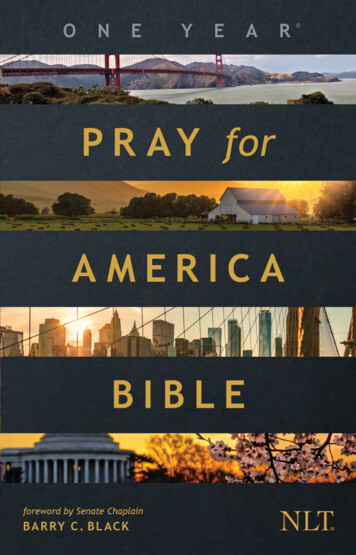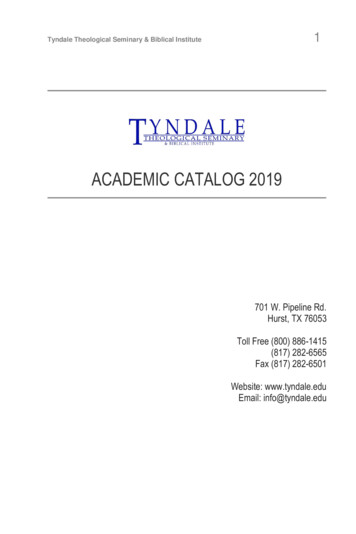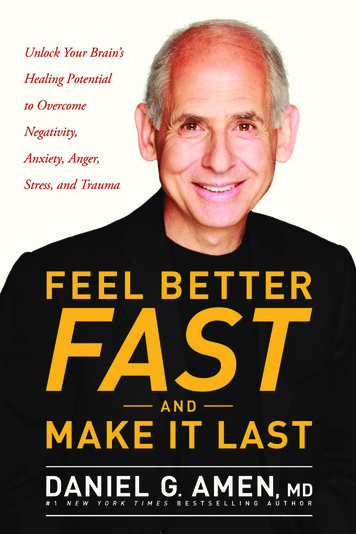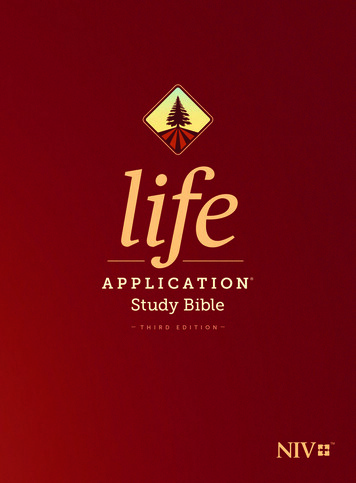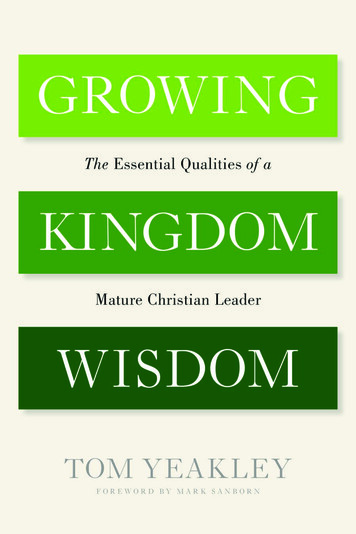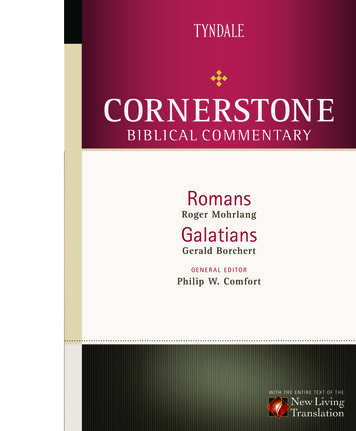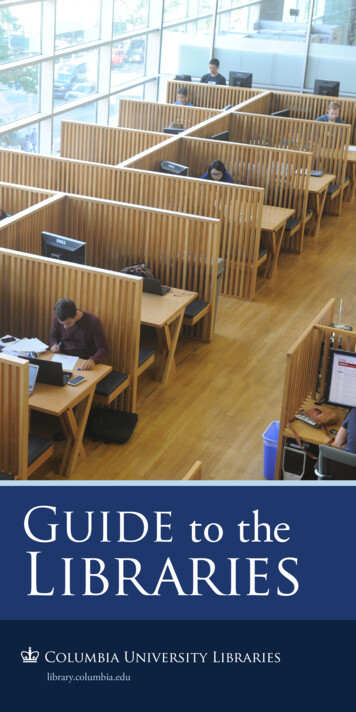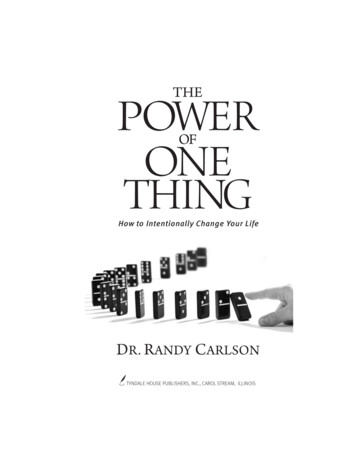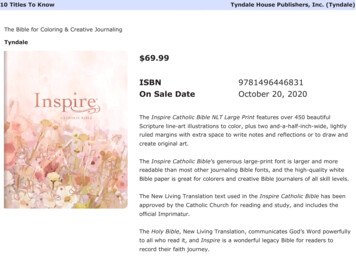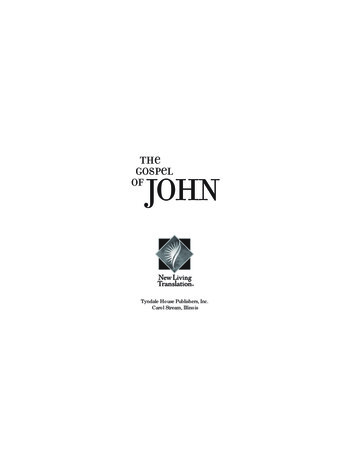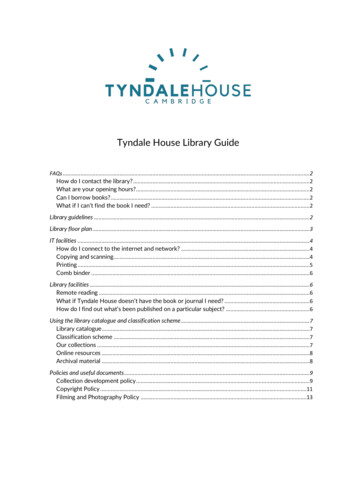
Transcription
Tyndale House Library GuideFAQs .2How do I contact the library? .2What are your opening hours? .2Can I borrow books? .2What if I can’t find the book I need? .2Library guidelines .2Library floor plan .3IT facilities .4How do I connect to the internet and network? .4Copying and scanning.4Printing .5Comb binder .6Library facilities .6Remote reading .6What if Tyndale House doesn’t have the book or journal I need? .6How do I find out what’s been published on a particular subject? .6Using the library catalogue and classification scheme .7Library catalogue .7Classification scheme .7Our collections .7Online resources .8Archival material .8Policies and useful documents .9Collection development policy .9Copyright Policy .11Filming and Photography Policy .13
FAQsHow do I contact the library?The librarians can be contacted via email at library@tyndalehouse.com or by phone on 44 1223 566604What are your opening hours?Private Desk users can access the library from 8.00am-10pm, Monday to Saturday.Hot Desk users may access the library from 9am-5pm on weekdays.We are usually open to Private Desk users for more than 300 days a year.Can I borrow books?The library is reference only, which means all the books you need are always here.What if I can’t find the book I need?The library staff are happy to help you locate resources. If you want to recommend a book forpurchase please email the details to library@tyndalehouse.com.Library guidelines Please help us to keep the library as a silent study zone. Personal belongings are the responsibility of their owner and are not covered by TyndaleHouse insurance. Food and drink are not permitted in the library with the exception of bottled water. When you leave your desk for the day please close your window and blind and switch offyour lamp and radiator. Please return your access card to reception at the end of your visit.
OH5OH6OH7OH4OH3IH3OH8IH4IH2 LOWERIH5HEXAGONG1G2G3G4G5G6IH1OH2Black Desk numbersPurple Classmarks and shelf locationsGreen Other practical 1933935L4MAIN LIBRARYFIRE 27S9225226S8224225S7OH9OH1OH10OH11G12Theses S3S2HD2HD3NewBooksNewjournalissuesFIRE ARY ENTRANCE949PUBLICCOMPUTERSEPRINTING &03.27COPYING265LIBRARY041 &269OFFICELoeb237Unbound264journals &STAIRSOversizeJournalsTo 270-289935939S1BACKENTRANCETELEPHONEKIOSKLINK CORRIDOR232.3-237
IT facilitiesHow do I connect to the internet and network?There are two WiFi SSIDs available to connect to the internet: using the Tyndale-FREE serviceallows you full internet access and access to Tyndale House subscriptions, printing and othernetworked resources; using the UniOfCAM service allows you to access the University’s fullrange of electronic resources.Wifi (library)Connect to “UniofCam”. Members of Cambridge University can use their Raven ID; Membersof other academic institutions can use their EduRoam ID; other visitors can request a wifi ticketfrom the library office.Wifi (common room)Connect to “Tyndale Free Wireless”. The current password is on the notice board.Anti-virus and securityIt is strongly advised that all readers install anti-virus software.The following alternatives are available free:Anti-virus software: AVG for PC, AVAST for PC, or Sophos for MacAnti-spyware: Spydot Search & DestroyPC users should classify both the Tyndale-FREE network and UniOfCam network as ‘public’which will prevent any network user from connecting to your computer using scanningsoftware. Windows Firewall is compatible with the Tyndale House network.Copying and scanningPlease refer to page 11 for our copyright policy and details of what you may and may notcopy. We have an all-in-one photocopier, printer and scanner for use by readers and staff,located near the library entrance. Library materials may be taken out of the main library for thepurposes of copying/scanning and must be returned immediately afterwards.If you encounter any problems with printing, scanning or photocopying please ask the librarystaff or IT Officer for help.Costs and paymentPrinting or photocopying(buy a copy card from reception)Black and white A4Black and white A31 credit per page2 credits per pageDigital scanning(no copy card needed;pay-as-you-go by cash)2p per scan2p per scan
Colour A4Colour A32 credits per page4 credits per page2p per scan2p per scanThere are three copy card types available:10 credits40 credits100 credits500 credits 1.00 3.00 5.50 27.50PrintingThe printer/copier/scanner is located just outside the library entrance. You can print via theTyndale-FREE network or using a USB stick.Printing via the networkPlease send any documents you would like to print via email to print@tyndalehouse.com, ashared email account which can be accessed from the library computers near the libraryentrance. Once you have opened your document from this inbox, please select “print” and abox will pop up asking you to set an ID and Password in order to retrieve your document atthe printer. This will happen each time you print a document. The ID and Password can beanything you choose — they can be as simple as your initials. Both the ID and Password arecase-sensitive.To print your document Insert your copy card into the EMOS reader next to the printer. On the control panel screen tap “User box”. Tap the “Secure print” option. Type your “ID”. Tap “Password” and type your password. Tap the image of your document to select it. Tap “Print”. Press the illuminated oval blue buttonPrinting via USB stickOnly .pdf files and Word .docx files can be printed directly from a USB stick. Insert your copy card into the EMOS reader next to the printer. Insert your USB stick in the slot on the right-hand side of the unit (just around the cornerfrom the control panel screen). On the control panel screen tap the “External Memory” option. Select the file that you wish to print. Tap the “Print” option. Press the illuminated oval blue button.
Comb binderIf you wish to use the comb binder for your printed document, please ask the library staff. Wecan supply a comb and two covers for a flat fee of 1.Library facilitiesRemote readingIf you are off-site and require a book chapter or journal article we can scan it and email it toyou for a small fee. Please use the order form to make your remote-reading You may request up to five items per order. Please give as much information as possible about the item. If in doubt, please check thecatalogue. Email your completed form to scans@tyndalehouse.com. We aim to complete your order within one week. Please let us know if you need the item(s)urgently.Cost The cost is 5 for the first item and 4.50 for subsequent items on the same order. A discount is available for those living and working in the Majority World. The librarian reserves the right to add a surcharge for articles and chapters over 40 pages.What if Tyndale House doesn’t have the book or journal I need? Journal articles not held by Tyndale House library are often available via the British Library’sOn Demand service. Alternatively, if you live in the UK you may be able to request the item through your localpublic library. Please make your payment online (there is a PayPal link on the form).How do I find out what’s been published on a particular subject?You can search our library catalogue to browse the latest titles which we’ve purchased but fora comprehensive overview of what’s been published in your field consult:Old Testament Abstracts and New Testament Abstracts (print and online)The online editions can be accessed on-site via our library catalogue.
Using the library catalogue and classification schemeLibrary catalogueOur library catalogue is freely accessible online here. It is updated continuously by our librarystaff who are trained in bibliographic description. All books are entered on the catalogue at thepoint of purchase, so you can check what is on order as well as what is in stock.Classification schemeWe use a specially tailored version of the Dewey Decimal Classification Scheme whichprovides greater detail in the subjects we focus on in order to serve the needs of our readers.Key class marks s800s900sGeneral works on the whole bibleDead Sea scrollsOld TestamentNew TestamentApocrypha and PseudepigraphaTheologyPatristicsHistory of Judaism and Jewish literatureLinguisticsBiblical languagesHistory of and texts from the ancient Near EastOur collectionsTyndale House library contains one of the world’s most outstanding collections of academicworks on biblical studies. We specialise strictly in the biblical text, interpretation and historicalbackground, and aim to collect virtually all important academic works within these disciplines.Printed booksThe collection includes more than 45,000 monographs. We buy about 800 titles every year,focusing on biblical exegesis but also expanding our collections on Jewish literature andJudaism, ancient languages and linguistic studies, and the history of the Near East. We collecttitles in many academic series but also welcome recommendations from readers.Printed journalsWe have around 400 journal titles, of which around 200 are current subscriptions. The latestissues are displayed near the library entrance. The most recent 1-4 years are stored in Bay 1;after binding, older volumes are stored on the uppermost shelves in the library starting in Bay1 and moving clockwise round the library.
Pamphlet collectionWe have a substantial collection of journal off-prints and pamphlets. Please ask the library staffif you wish to access this collection.Microfiche readerIf you wish to use the microfiche reader please ask the library staff.Online resourcesAll our online resources are accessible via our library catalogue. Subscription resources mayonly be accessed on-site.Online databases and useful websitesOur main subscription databases are: Old Testament Abstracts Online and New TestamentAbstracts Online. We also catalogue high-quality open-access databases and websites.Online journals and ebooksWhere available, we subscribe to the electronic as well as print editions of journals. Wecurrently have access to the full text of 50 journal titles and this number is constantly growing.Our catalogue also contains links to over 8,000 open-access journal articles and we are addingopen-access ebook titles all the time.OpenAthensWe offer readers the chance to access most of our subscription e-resources off site throughOpenAthens, the single sign-on platform and authentication system. Please contactlibrary@tyndalehouse.com if you would like to register for an account. (Within the library,you may access e-resources via our WiFi (see p. 4), including the large number of subscriptione-resources provided by Cambridge University Library.)Archival materialThe collection of the Tyndale House library archive includes the archives of Tyndale Houseitself as well as the personal papers of various people associated with Tyndale House. Theseitems are not included in our library catalogue. Please speak to the library staff for moreinformation.
Policies and useful documentsCollection development policyLibrary Collections Management, Development and DisposalsIntroductionThis statement outlines the general policies and priorities by which Tyndale House Librarywill select, maintain and manage its holdings and access provision in order to fulfil its missionto support research.The statement’s chief aims are to assist in systematic collection development andmanagement, to ensure the cost-effective and relevant selection of resources and to informreaders of the basis of decisions made pertaining to the collections.1. Purpose of the collectionLibrary sources of information are seen as a valuable strategic resource to be acquired andmanaged efficiently and to be readily accessible and relevant to potential readers. Systemswill be in place to manage information resources so that they can be effectively accessed andretained, and their content disseminated.2. Subject Collection Development PolicyThis policy covers the areas below and is regularly updated. Its aim is to state the currentlevel and extent of collecting activity appropriate for research needs; possible alternativeaccess to material from other collections in Cambridge University; criteria for selection,acquisition, and withdrawal.3. Users of Tyndale House LibraryAll researchers, either attached to an Institution or independent, working in the subject areaof Biblical Studies and related fields covered by the purpose and mission of Tyndale House.Approved readers will have access to all resources available within the Library, including eresources as covered by licensing agreements and other media. A small collection ofprofessional literature is maintained for Library staff.4. Budget allocationFunds for the purchase resources are allocated annually. Selection responsibility: selection ofresources is the shared responsibility of academic and Library staff.Criteria for selection and acquisition:The following factors will influence the decision to acquire (or purchase licensed access to)resources: Scope and relevance of the content to post-graduate research on Biblical studies
The known or anticipated demand from usersPaperbacks or hardbacks are acceptable according to availabilityThe Tyndale House Librarian controls the budget for the purchase of resources and upkeepof the collections.5. ConservationItems in need of conservation are prioritised by the Librarian according to use and condition.6. Future DevelopmentTo acquire material relating to the focus of the collection. This focus includes printed booksand journals as well as electronic content and other media as appropriate.Additions to the collections will be assessed on their relevance to and enhancement of theexisting collection and existing or planned research within Tyndale House.7. DonationsDonations of printed material are accepted at the discretion of the Librarian.When deciding whether to accept donations of printed material, the following factors will beconsidered: whether the material the physical condition of the material; the cost implicationsof processing and cataloguing the material; the cost of accommodating and providingappropriate access to the material.Donations of printed materials are accepted on the understanding that they become theproperty of Tyndale House. The Library will organise and locate donated materials accordingto its collection management criteria and will appropriately dispose of unwanted material.Those considering donating collections of more than 20 printed volumes should contact theLibrarian in the first instance. In the case of unannounced or anonymous donations theLibrary will assume that the owners are aware of the guidelines above.8. Alternatives to acquisitionVisiting other libraries, such as Cambridge University Library may provide satisfactory accessto material. Forms for access to and use of the Cambridge university Library are available forprivate Desk readers from the Library Office9. Stock withdrawal and disposalItems which have ceased to be used, or are used very infrequently, and are not relevant tothe focus of the collection may be withdrawn from stock and disposed of, in consultationwith academic staff.Withdrawn stock may be disposed of by sale or as gifts to other institutions or charities; ordestroyed using environmentally friendly means.
10. Management of archivesAs the Organisation holds archives, including photographs and printed ephemera, itsmanagement will be guided by the Code of Practice on Archives for Museums and Galleriesin the United Kingdom (3rd ed., de.pdf11. Policy ReviewPolicy to be reviewed and revised annually by the Deputy Librarian and the Vice Principal ofOperationsLatest revision: September 2018Copyright PolicyFor information on Intellectual Property Rights please see our Intellectual Property Rightspolicy. Please contact the library for a copy.Tyndale House upholds Copyright Law in respect of copying and scanning works within theCollections of Tyndale House Library.What is copyright?Copyright is mainly based on the Copyright, Designs and Patents Act 1988, andsubsequent revisions including the Copyright and Related Rights Regulations 2003,Copyright Rights in Performances Regulations 2014, previous Copyright Acts (1911 and1956), and Directives, Treaties, Conventions and Case Law.Copyright is an exclusive economic right granted to the creator of original work to permitor prevent other people from copying it.Copyright does not protect an idea, only the material expression of the idea.Works are protected regardless of artistic merit, although they need to be original and/orshow skill and judgement.What does copyright protect?Copyright only protects certain things specified by the Copyright Act - if it does not fallwithin one of the eight categories – it will not be protectedThese categories are: Literary works, Dramatic Works, Musical Works, Artistic Works,Broadcasts, Sound Recordings, Films and Typographic WorksHow are works protected?There is no need to register copyright in the UK: it exists automatically as soon as a workin one of the above categories is created
There is no need to use a copyright symbol in the UK, if a work is protected by copyright,it will be protected anywayFor most works, copyright protection in the UK lasts 70 years from the end of the year inwhich the person who created the work dies. When the creator dies, copyright normallypasses to their estate unless they specify otherwise.As a general rule, the first owner of copyright in a Work(s), the “Copyright Holder” will bethe person who produced the work unless it was made by an employee in the course ofhis or her employmentA Copyright Holder is able to transfer the legal ownership of that copyright to a thirdparty (also called an "assignment") or grant permission to use it under licence.What are “Moral Rights”?Moral Rights relate to the creator’s honour or reputation. They give the creator:The right to be named as the creator of the work (paternity right)The right to object to someone wrongly named as the creator of his/her work (falseattribution right)The right to object to derogatory treatment of the work (derogatory treatment right)Moral rights can’t be assigned to anyone else (unlike copyright), but they can be waived.Copyright RestrictionsIn respect to copying, scanning, or photographing/filming a printed work: Under UK law, theconcept of “Fair Dealing” allows the lawful reproduction of a work without having to seekpermission from the copyright owner.Fair Dealing permits making a copy:if the use is for private study or research orif it is used for the purposes of quotation, criticism or review Under Fair Dealing you maymake a single copy of:up to one chapter or 5% - whichever is greater - of a published bookup to 10% of a short book (up to 200 pages long)one poem or short story of up to 10 pages longone article from any single issue of a published journalOnly single copies are permitted - unless you are authorised to make multiple copies underthe Copyright Licensing Agency (CLA) Photocopying, Scanning and Digital Re-Use –Comprehensive Higher Education Licence. See https://www.cla.co.uk/higher-educationlicence for information.Unless authorisation has been given, any digital copies must not be placed on a network oronto the Internet.Please note that unpublished materials – such as theses and dissertations – are not coveredby Fair Dealing. You may only copy from these with the written consent of the author.
Creative Commons LicencesCreative Commons Licences have been developed by Creative Commons, a not-for-profitcharity www.creativecommons.org. In order to facilitate sharing of creative works, CreativeCommons have developed several licences to enable rights holders, and those acting with thespecific authorisation of rights holders to use, share and reuse their work.Disclaimer: None of the information contained within this document should be construed aslegal advice. Should specific legal advice be required, please consult the appropriate legaladvisor. NB Some of the information here is taken from material by Naomi Korn andlicensed for use under a Creative Commons Attribution Share Alike Licence (CC BY SA)Filming and Photography PolicyAnyone wishing to film or take photographs within the Library needs to seek permission fromthe Library Staff.Filming/photography activities should not impact on silent study or cause any disruption toothers using the Library. The Library will try to accommodate requests wherever possible,although some requests may be refused or modified to meet the needs of all users.TimesFilming/photography should take place during fully staffed opening hours 9.00 – 17:00 hourson weekdays.LocationsFilming/photography should not block any fire exits. This requirement is for health and safetyreasons since stairwells and fire exits must be kept clear at all times in the event of anemergency evacuation.CrewsCrews may come in ahead of time to quietly to determine the area and plan their shoot. If thefilming/photography involves a lot of equipment, a risk assessment should be carried out bythe person/people undertaking the work and the member of staff in charge of Health andSafety will check that the set-up is safe (e.g. no trailing wires or obvious H&S concerns).Library PropertyFilm crews must respect Library property, and not move, rearrange or remove any materials,furniture, equipment etc. without consultation and permission to do so.Please provide the following information: Date and time of the proposed shoot
Exact location of the proposed shoot within the LibraryNumber of people involvedNature of the shoot - if anyone is to be captured in the film/photograph, thefilmmaker/photographer needs to obtain written consent from those persons inadvance of the shoot.Reason for the shootApprovalFilming and photography requests can be considered and approved by contacting: Mr SimonSykes (Vice Principal operations) vpo@tyndalehouse.com Tel. 01223 566604Please note that the Library does not commit to organising or arranging filming orphotography, it simply acts as a venue for it to take place in.Photography of library materials using a digital or SLR-lens camera, is permitted only underthe following conditions and at the discretion of the Librarian: You must read and sign a copyright declaration form.You must NOT use flash photography.Items to be photographed must be handled with due care, using foam supports andweights as necessary, and avoiding any unnecessary stress to the item, such asbending book spines or removing file fastenings, etc.Photography may only be carried out in the area designated by the Librarian.Photography may only be carried out on condition that it does not disturb otherreaders. In circumstances where this is likely to be the case an appointment may haveto be made to photograph items at another time.You may only take 10% of any image or map owned by Tyndale House in total.Scanners, camcorders, digital camcorders and mobile phone cameras are notpermitted.If you wish to publish images, please speak to the Librarian. A fee may be applicable for thecommercial use of images taken at Tyndale House, the amount being dependent on thenature of the publication and the intended print run.
There are two WiFi SSIDs available to connect to the internet: using the Tyndale-FREE service allows you full internet access and access to Tyndale House subscriptions, printing and other networked resources; using the UniOfCAM service allows you to access the University's full range of electronic resources. Wifi (library)
